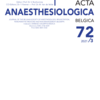Effects of intravenous lidocaine on alfentanil consumption during procedural sedation for colonoscopy in patients with inflammatory bowel disease: a randomized controlled trial
Deep sedation; Lidocaine, Alfentanil, colonoscopy
Published online: Mar 29 2022
Abstract
Background: Procedural sedation and analgesia (PSA) is used during colonoscopy to facilitate the procedure and relieve patient’s discomfort. The foremost risk of PSA is respiratory depression. Lidocaine could be a promising additional analgesic in IBD patients to minimise side effects of PSA.
Objective: Our primary objective was to investigate whether i.v. lidocaine reduces the amount of alfentanil used during PSA in IBD patients. Additionally, we investigated whether lidocaine reduces cardiorespiratory incidents and the amount of propofol required during the procedure.
Design: A randomized, double-blind, placebo controlled study.
Setting: Single-center study from November 2016 to December 2018.
Methods: Seventy-six patients with IBD, ASA 1 or 2, between 18 and 65 years, scheduled for colonoscopy with PSA were included. Exclusion criteria were: pregnancy, emergency colonoscopy, allergies for study medication, rhythm disorders, cardiomyopathy, BMI < 18 kg m -2 , BMI > 35 kg m -2 , obstructive sleep apnea syndrome and uncontrolled hypertension. Patients received lidocaine 1.5 mg kg -1 followed by a continuous infusion of 2 mg kg -1 h -1 (intervention group, n=38) or 0.9% saline in equivalent volumes (control group, n=38) during colonoscopy.
Main outcome measures: Amount of alfentanil and propofol used during the interventional procedure. Cardiorespiratory events as defined in methods during the colonoscopy.
Results: There was a not statistically significant reduction in the use of alfentanil [327 µg (95%CI=-31-505, p=0.082)] and propofol [39 mg (95%CI=-5-83, p=0.083)] in the lidocaine group compared with the control group. Ten patients (26%) in the control group and 8 patients in the lidocaine group (21%) experienced a period of hypoxia (p=0.788). In both groups, no periods of hypotension were noted.
Conclusion: Our investigation has shown a trend for reduced alfentanil and propofol consumption in patients receiving lidocaine during colonoscopy under sedation. The differences were not statistically significant. Lidocaine did not reduce the incidence of cardiorespiratory events.
